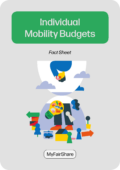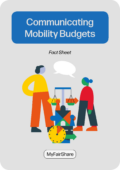

MyFairShare Policy Guidance
The policy guidelines developed in MyFairShare offer evidence-based decision support for selecting the most effective instruments for implementing Individual Mobility Budgets.
These recommendations are intended to facilitating the selection of appropriate policies to increase their effectiveness and avoid (further) disadvantages for specific population groups.
The MyFairShare Policy Guidance can be downloaded below as individual thematic fact sheets or as one complete document.

Fact Sheet – Individual Mobility Budgets
The concept of Mobility Budgets breaks down larger emission reduction targets into smaller efforts. A massive challenge turns into an achievable goal on a personal level. In this way, the ones affected can personally determine how savings are achieved and what framework conditions are required for it.

Fact Sheet – Communicating Mobility Budgets
An adequate set of communication strategies helps to promote the understanding of and the acceptance for individual mobility budgets among the relevant target groups.

Fact Sheet – Mobility Budget Planning Scenarios
The implementation of mobility budgets offers a more precise strategy for addressing carbon footprints associated with travel. When prioritising the mobility budget in municipal transport route planning, factors such as accessibility, variety of mobility choices, inclusivity of transportation modes, and social justice need to be considered.

Fact Sheet – Dealing with Ripple Effects
Ripple effects are unintended side-effects of measures or instruments, including rebound effects, spillovers, moral licensing and burden-shifting. Mobility budgets need to be carefully designed to avoid simply shifting problems to other sectors. Find out what to consider.

Fact Sheet – MyFairShare Project Information
A brief project information about MyFairShare, a pan-European research project that builds on the sufficiency principles to change mobility habits through individual mobility budgets.